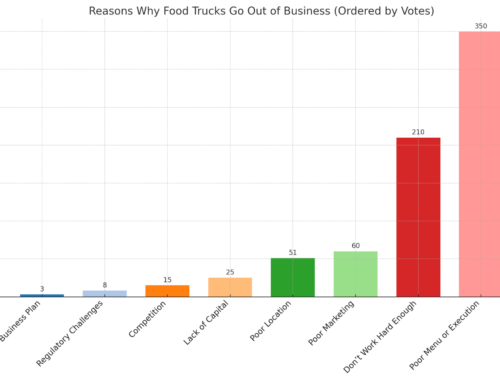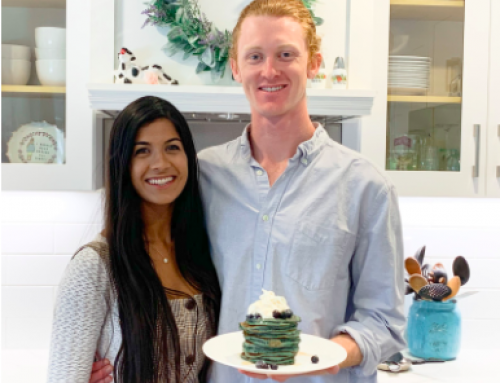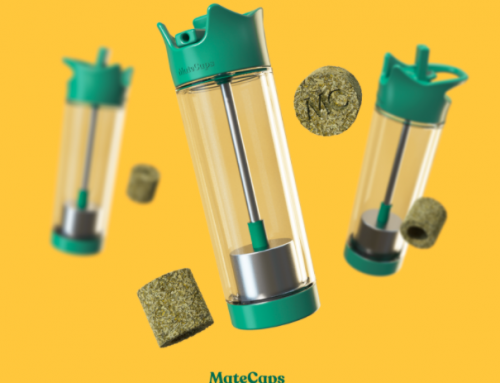Hello! Who are you and what food business did you start?
Hello! We are Jennifer and Brett Cramer, the founders of The Spice Lab. We specialize in premium all-natural seasonings, salts, spices, sugars and gourmet gifts sold through specialty food and major retailers, clubs, grocery, private label and online at Amazon and our website.
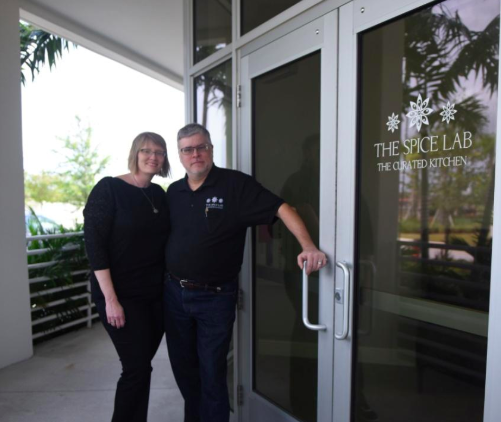
What are your estimated sales figures?
We have become a $10 million business with lots of different revenue streams — from major discount retailers such as TJ Maxx to Costco and private label for companies like Trader Joes and Fresh Market as well as a strong presence on Amazon.
When we started, we specialized in sea salts from around the world and have become one of the largest US importers of Himalayan Pink Salt. Besides salt, our product line includes over 50 all-natural proprietary seasoning blends, spices, sugars, teas and more.
What’s your backstory and how did you come up with the idea?
A homemade Christmas gift in 2009 sparked the start of The Spice Lab. Brett wanted to share his new-found fascination with gourmet sea salts with his family and friends.
Enjoying woodworking as well as being an avid gourmet cook, he handcrafted a wooden base out of scrap lumber to hold test tubes filled with exotic sea salts from around the world. He posted them on Amazon over Thanksgiving weekend so friends could buy them for others – and they sold out – all to complete strangers who just discovered them on Amazon.
Jennifer wanted to start a company and thought that Brett’s creation would be an ideal way to enter the gourmet gift business. Throughout 2010, the company’s online business grew as the company added an array of smoked sea salts and salt collections and became a direct importer.
Jennifer’s interior design background influenced the products and packaging that garnered early market acceptance and ignited sales. Selling his dot-com business in January 2011, Brett joined Jennifer along with a growing staff to devote their energies full time to building The Spice Lab and its retail distribution.
These Gourmet Salt Collections have won numerous awards and accolades including a Silver sofi Award from the Specialty Food Association and media coverage in O, The Oprah Magazine, Dr Oz, Cosmopolitan and numerous others.
While the company has sold over a hundred thousand of these gift sets, they are now a small fraction of the business which today focuses on all natural seasonings for retail, grocery and private label opportunities.
Take us through the process of developing your first seasoning product.
We started building wooden bases using wood working equipment that belonged to Brett’s father. We started using scrap lumber, then reclaimed Colorado pine and eventually, we found an overseas source to craft sustainable bamboo bases for the salt kits.
The salts we bought in bulk and filled Pyrex tubes with an all-natural cork stopper.
The kits are still assembled by hand and processed and packaged in our HAACP- certified production facility in Pompano Beach, Florida.
Describe the process of launching The Spice Lab.
As a technology entrepreneur, Brett was ahead of many others in being able to establish a website and sell through Amazon.
We used our own money starting out from the sale of our previous business. Then we had an SBA loan for a short while before forming a strong relationship with our banker to establish a line of credit to help fund our growth.
We used space we had from the previous business to get started — about 7,500 sq feet in two small buildings. By fall of 2013, the company moved into a 15,000 square foot building and quickly outgrew the space. In March 2017 we expanded into a 75,000 square foot facility to accommodate more packing lines, a graphics department, development kitchen and a full showroom.
Now with six production lines, the company can produce 25,000 units per day and expand its sales base to handle more private label and food service business.
In October 2016, we also opened our retail shop and artisan market in Fort Lauderdale, Florida. The store is a great way for us to test new products direct with our customers.
We also work with other small businesses in specialty foods to help them introduce their products to market. Besides our own products, we try to only carry lines and brands that cannot be found at the major retailers.
When we started out, we had a display at the Atlanta Gift Mart and a Home Goods buyer came by and said “oh that’s cute, can you do it for us?” Costco also saw us and invited us to a vendor show.
However, we delayed working with Costco until we were ready. We were just too small and waited at least a year before we had production capacity to fill their orders. It’s been an awesome relationship with Costco – they want to be a part of your team. You can’t say that about all of the major retailers.
We eventually added sales people and now selectively work with brokers, but it is important to go slow and not get into costly relationships before your sales can support it.
Since launch, what has worked to attract and retain customers?
Quality, innovative products are critical to success in whatever you are doing. We consider packaging design as critical as premium ingredients. We enter product and business competitions and have garnered lots of media attention. This attracts more customers and assures retailers that they are bringing in quality products that will sell.
The South Florida Business Journal has numerous recognition programs, from Fastest Growing Company lists, Business of the Year and Influential Women awards.
Over the past several years, we have been in them all. We also have been recognized by INC Magazine on their INC 5000 list of fastest growing privately held companies. It’s based on percentage growth so especially useful for newer companies who are often on a faster growth curve.
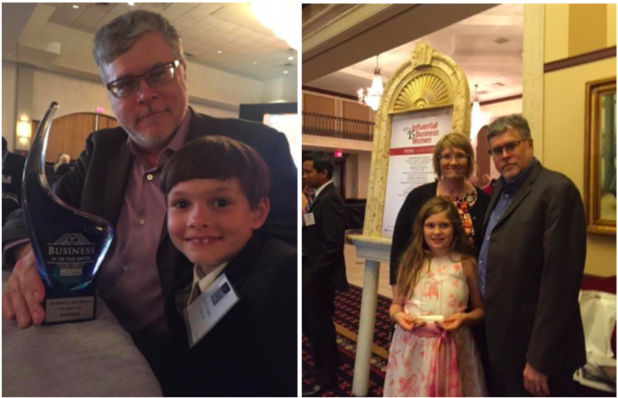
In our industry, the Specialty Food Association has the annual sofi Awards program, which is like the Oscars for specialty food products. We won in 2012 as an innovative gift product with our Salt Collections and again in 2018 for our Chorizo Seasoning.
We enter every year and also exhibit with a booth at the Winter and Summer Fancy Food Shows put on by the organization. These shows also are very important in attracting and retaining customers as well as media recognition.
We enter various other competitions such as the Scovie Awards, Hot Pepper and Fiery Foods for spicy foods and some BBQ competitions. Additionally, trade publications such as Progressive Grocer have annual New Product Editors’ Pick Awards and we have entered and won those as well.
We strive to be a category leader and stay ahead of trends. We were very early in the market with products like Himalayan pink salt and turmeric – now commonly found on all retail shelves.
How are you doing today and what does the future look like?
Clean label products are key. It’s why over a year ago we reformulated our seasoning blends to be all-natural. We have received the USDA NOP Organic certification so we can package organic products for wholesale customers and are pursuing other industry certifications.
Our private label business continues to expand. Store brands are experiencing significant growth in all categories and that positions us well to serve smaller chains and specialty food stores that cannot meet the minimums of the larger producers.
We are doing some branding work with noted chefs and announced at the Summer Fancy Food Show in June a relationship with Wolfgang Puck. Also at the show, we showcased a line of KETO seasonings.
While seasonings in general have no carbohydrates and therefore are keto friendly, packaging with a KETO label takes the uncertainty away for the consumer and reinforces their dietary choices.
Once the FDA comes up with some regulation standards for CBD in food products then we may explore that market, but it is too early
In starting the The Spice Lab have you learned anything particularly helpful or advantageous?
“Don’t put lemons in the water or iced tea.” According to food inspectors, cut lemons are a major source of contamination. They sit out, may be kept for several days and many people touch them before they are put into a drink. Just read this in an article about what restaurants don’t want you to know!
Now seriously, always know your supply chain. It’s critical to know the source for all of the products you are using. Consumers want this and with food sensitivity, allergies and special diets, you need to be proactive in knowing and communicating ingredients, with an emphasis on quality and clean label (no artificial ingredients and additives).
What tools do you use in your business?
We have lots of packaging, blending, labeling and printing equipment, along with warehouse forklifts, etc. For the business side, we use Excel spreadsheets and QuickBooks and are just now starting to use Salesforce.
From the kitchen perspective, we could not live without our chef-in-residence, Fiona who formulates our all-natural seasonings and develops custom blends for private label customers.
What have been the most influential books or training resources?
Brett: Food Network’s Alton Brown and Chef Gordon Ramsey have been very influential in my fascination with food and the food business.
If you want to see an excellent example of food demonstration marketing, watch Curtis Stone on HSN – he is masterful in making your mouth water and wanting to use his cookware and other products.
Jennifer: I have an art history and interior design background so that has been very influential in why esthetics and good packaging design are important to me.
What advice do you have for other food business founders?
If you don’t enjoy what you are doing, don’t do it. Be first in and first out with your products. And always choose quality and know where your ingredients come from. Cheaper is usually NOT better.
Keep a clean palate – no smoking or anything that would alter how you taste things. When you are in the food business – packaging and presentation are essential, quality is critical and above all else, it has to taste good.

